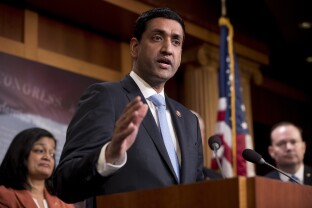President Donald Trump’s whiplash tariff policy has left industries that rely on foreign manufacturing to weather the uncertainty, and the technology sector is poised to take one of the biggest hits.
Supply chain experts say their best strategy is to pause U.S. investment until things settle down, the opposite of the White House’s goal of bringing manufacturing back to the U.S.
“Right now, nobody is moving forward on any kind of investment. You would be crazy to until the dust settles,” said Willy Shih, a technology and operations management professor at Harvard Business School.
Trump’s back-and-forth on economic policy has left Wall Street battered. Headlines about the market dropping, rising, rinse and repeat, have left investors struggling to navigate the uncertainty. The technology sector, which is heavily dependent on specialized foreign manufacturing, is no exception.
“No strategy is a good strategy at this point,” said Senthil Veeraraghavan, a professor of operations, information and decisions at the Wharton School of the University of Pennsylvania. “Any tech company that’s importing manufacturing as a physical product is going to face pricing increases, absolutely. I mean, there’s just no way to get around that.”
The White House has stated repeatedly that beyond decreasing trade deficits, a major goal of the tariffs is to reshore American manufacturing. The administration has even defended the idea that Americans could make iPhones, down to “millions and millions of people screwing in little, little screws to make iPhones.”
But the reality is that the U.S. is not equipped to take on the manufacturing of some of the pieces that go into products like a phone chip. The production of a phone chip can involve design in the U.S. using American software, then printing it in Taiwan. That process often involves printing onto a silicon wafer from Japan or Germany, and the piece might be assembled using tools from the Netherlands. After that, it could be sent to Malaysia for packaging, and then to a printed circuit board factory in China before finally making its way back to the U.S.
So the supply chain “tends to be very fragmented, and, you know, I think a lot of people really don’t understand how complex and how interdependent it is,” Shih said.
Lawmakers whose districts include major tech players have said the inconsistency of the tariffs makes it harder to move manufacturing here.
“The tariff policy is hurting the inputs that we need, and it’s not predictable. So this is not the way that you would bring advanced manufacturing back,” Rep. Ro Khanna, a Democrat whose district includes Cupertino, where Apple’s headquarters are, told NOTUS.
There’s even some concession across the aisle.
“There’s no doubt that uncertainty makes it difficult for businesses to make decisions on whether to deploy capital,” said GOP Sen. Ted Cruz of Texas. The state is increasingly becoming a tech hub for companies like Tesla, which is headquartered in Austin.
Cruz said that while talking to some of his state’s employers, “without exception, they would prefer greater certainty.”
Another major issue, Veeraraghavan said, is the expertise involved in developing and manufacturing technology. Specialists are generally located where the manufacturing is, since the tech supply chain is so piecemeal across the globe. This worried members of Congress as well.
“So much of our expertise has gone overseas, and so we’ve got to reinvest in that,” Democratic Rep. Pramila Jayapal told NOTUS. Her district includes most of the tech hub of Seattle. “That takes time. That’s not something that happens overnight, so you really have to do a one-two punch. And I don’t see the administration doing that at all. I see them doing indiscriminate tariffs and then also taking away the funds that we had actually put into domestic manufacturing.”
There are other reasons the tech sector is likely to be heavily hit by this uncertainty, including the shelf life of some of the products. Because technology advances fairly quickly, the life cycle of a product can be short, Veeraraghavan said, and stocking up on inventory is a very temporary solution.
The Trump administration indicated that retailers stocking up might be part of what they’re counting on. On Tuesday, Treasury Secretary Scott Bessent told NOTUS at a press conference that the White House did not anticipate supply chain shocks, now that cargo shipments from China were down.
“I wouldn’t think that we would have supply chain shocks. Retailers have managed their inventory in front of this,” Bessent said.
Another issue is the labor cost of producing in the U.S. relative to other parts of the world.
Even while Silicon Valley has gone redder, with tech executives looking to build relationships with Trump more than during his last administration, the tariffs have left some of the bigger Wall Street and tech players scrambling. Even Trump loyalist and Tesla CEO Elon Musk has taken to publicly and openly disagreeing with the policy.
“I just fail to understand,” Veeraraghavan said. “I think it is true that they did not believe that this would be too costly, and right now we are at a costly point where it’s just hard to readjust.”
—
Nuha Dolby is a NOTUS reporter and an Allbritton Journalism Institute fellow.
Sign in
Log into your free account with your email. Don’t have one?
Check your email for a one-time code.
We sent a 4-digit code to . Enter the pin to confirm your account.
New code will be available in 1:00
Let’s try this again.
We encountered an error with the passcode sent to . Please reenter your email.


